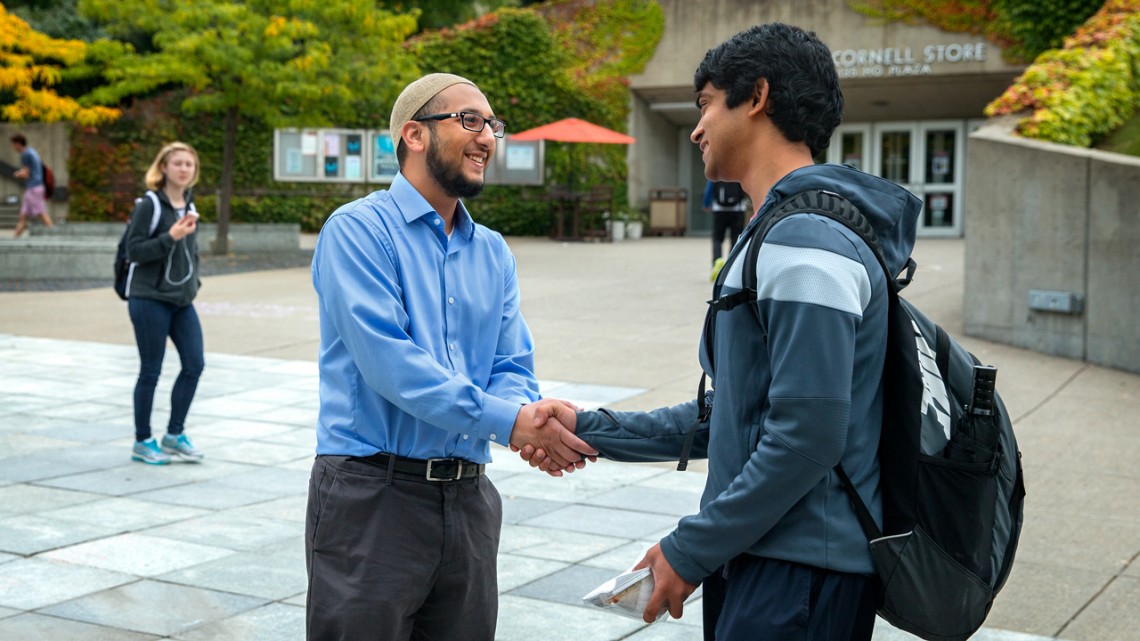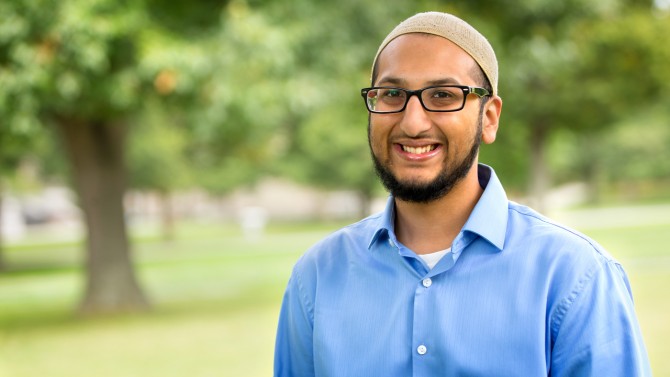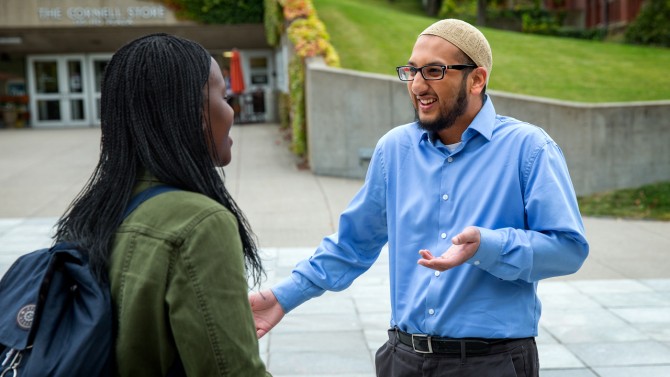
Yasin Ahmed, Cornell's first Muslim chaplain, greets a student on Ho Plaza.
‘Moving toward harmony’: Yasin Ahmed, Cornell’s first Muslim chaplain
By Daniel Aloi
Arriving on campus in August alongside new students, Yasin Ahmed, the university’s first Muslim chaplain, was impressed.
“The first thing that struck me about the students in particular is their humility and willingness to learn,” he said. “They have a growth mindset, which made this opportunity so fertile, because they’re ready to grow into their humanity completely. They have an understanding and awareness of that which is beyond them and within them. … The more that I talk to them, the more inspired I am. And their work ethic is incredible. How they do as much as they do is baffling to me.”
“We’ve remarked in our chaplaincy training that stress is often the point of transformation,” he added. “To be in an intense situation, and Cornell is an intense place, that causes those moments of sincere reflection – the points where people decide, ‘I need to do something to make myself be stable consistently, and to be happy forever, what is it I have to do?’”
“Chaplain Yasin” to students and others he meets on campus and in the Ithaca community, he said a large part of his mission here is serving the entire community in “moving toward harmony.”
“This is the perfect place to be a chaplain, and I really appreciate this opportunity,” he said.
As a chaplain at Connecticut’s Trinity College last year, he said, “we were going through the election together. When you look at the number of hate crimes, of mosque burnings, the number of violent deaths, there were and are a lot of different things to be worried about. … My job is to provide a sense of comfort and security here, for you to know that your voice is heard, no matter what.”
In addressing Islamophobia, he believes in helping Muslims “to develop an identity that you’re proud of and that you’re willing to stand up for, and you’re not going to give up just because of social pressures.”
His role is “to continue to be here pastorally for them, from the counseling aspect, [and tell them] ‘Yeah, it’s really scary out there, dude!’ It’s frightening, it’s real, the anxiety is reasonable. [I will] sit there with them and say, ‘We’re going to get through this together.’”
Just as important is “building outward bridges with other communities that are interested in our shared humanity. I don’t think Islamophobia is a Muslim issue; it’s a human issue. Prejudice, racism, all the different types of violence, sexual violence – these, to me, are all a part of the same concern: Where is our humanity?”
Establishing the chaplaincy fulfills a long-held goal of the Diwan Foundation for Cornell Muslim Life, an alumni organization. Students, faculty and other campus chaplains at Cornell United Religious Work (CURW) also supported the position.
Because Cornell’s charter does not provide for funding religious positions, the chaplaincy was “funded through support from alumni, students, families and others,” said Fariha Ahsan ’13, Diwan’s director of student-alumni relations.
“I am so grateful to Diwan on behalf of the community here,” Ahmed said. “It is sincerely a selfless act that they’ve supported and advocated for in every possible way. They were listening to the students’ concerns after they graduated and left, and they held on to those stories for years as they built up this chaplaincy program.”
“My understanding,” he added, “is they don’t want me to just benefit the Muslim students here, but to add a level of wellness to this entire community, and build a coalition of humanity that’s working toward the betterment of the community.”
Ahmed has a record of empowering young people and building interfaith coalitions to establish strong, mutually beneficial communities, according to the foundation.
“He’s very good, especially with the students – he is young, so he kind of understands the students very, very well,” Diwan president Jarra Jagne ’90 said. “We are really pleased to have him. He’d done a lot of interfaith work, which was important for us also, because CURW has a very interfaith focus.”
Although Cornell had more than 30 chaplains, with no Muslim representation “there was a deep gap, and CURW was very supportive because they thought that they were missing something,” said Jagne, a senior extension associate in the Department of Population Medicine and Diagnostic Sciences in the College of Veterinary Medicine.
“It’s not just about religion; it’s about a person who understands social work and mentoring, who is very multifaceted,” she said. “We found that person. I can’t keep up with him; he’s very energetic.”
Ahmed majored in communications at Rutgers University, graduating with honors, and recently earned his master’s in Islamic studies and Christian-Muslim relations from Hartford Seminary. He has served as a chaplain at Trinity College, Choate Rosemary Hall and Madina Academy in Connecticut; led interfaith and youth programs, and spoken to various groups on Islamophobia, the American Muslim experience and community development.
Ahmed keeps office hours in Anabel Taylor Hall and has started a first-year and transfer student support group that meets Mondays, “to provide a space for students to talk about what is going on with them. You’re so overwhelmed in college, this is a break to process what just happened in the week before, work on coping skills for stress and give them the tools that they need.” This “ounce of prevention” approach includes giving new students peer mentors, he said.
At Trinity, he discovered that beyond counseling, “students really wanted to learn about spirituality and religion. I’m getting the same feedback here. So we’re starting with daily prayers Monday through Friday at 5 p.m. in Willard Straight Loft III, and will keep working on other things planned – educational programs, discussions for different groups, religious and spiritual instruction for how they identify.”
In addition to chaplaincy services and shaping activities on campus, Ahmed also will assist Diwan with outreach for fundraising and other initiatives at events including “alumni dinners in major cities for major Muslim holidays,” Jagne said.
Media Contact
Get Cornell news delivered right to your inbox.
Subscribe
